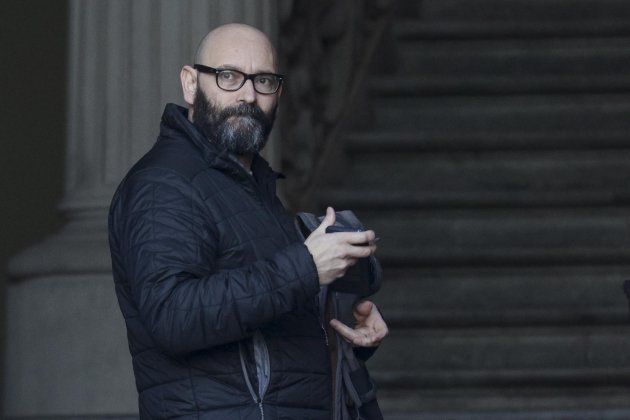Laura Borràs appeared this morning outside the entrance to the Catalan High Court (TSJC) wearing a velvet jacket in an intense brick red shade. The same colour as the walls of the courtroom, but stronger. And the same colour as the shirt of computer scientist Isaías Herrero, who incriminated her in his testimony today, along with the third of the defendants, Andreu Pujol, for the alleged splitting of contracts when she directed the public cultural body, Institute of Catalan Letters. The prosecutor is demanding 6 years in prison and a 21-year ban from public office for Borràs and Herrero for the crimes of document falsification and abuse of authority. This Monday, with the preliminary issues resolved, the trial started.
At the doors of the TSJC, the only gathering that was there at ten in the morning, when the hearing began, was a group of about fifteen people exercising and the only chants that could be heard were those of the trainer who led the session. Inside the chamber, Borràs was accompanied by her daughter and brother, who were sitting in the first row of one of the public seating areas, while, on the other side, was the Catalan MP Francesc de Dalmases, and Borràs' chief of staff and press secretary at the Parliament, along with two friends of the family. The rest of the court was practically empty.
The plot twist introduced by the incrimination of Borràs by the other two defendants this morning did not come as a surprise. The agreement they reached with the public prosecutors, which will probably result in a reduction in the prison sentence which the prosecution will demand for both of them, was a spoiler that quickly became public knowledge two weeks ago, and the dramatic tension of the day had been lost before it began.
Borràs does not recognize the crime
However, Borràs maintained her strategy and position. When TSJC presiding judge Jesús María Barrientos asked Borràs if she recognized herself as the author of the crimes imputed to her, the answer was: "Absolutely not. I do not recognize any crime." Then, it was Isaías Herrero who had to answer the same question, which he did by laconically admitting responsibility for the events. This was to be the signal to detonate the evidential bombshell. And yet, despite the undeniable power of the charge, in the hands of prosecutor Assumpta Pujol, veteran but not very skilled in the art of questioning, it came across as a damp squib.
The prosecutor's questions allowed Herrero to explain that with Borràs they simulated tenders in order to split contracts, presenting "dummy" budgets which would be rejected along with the projects which did go ahead. The interrogation was slow and cumbersome. There were times when it was difficult to find documents in the complexity of the indexing, drawn up first by the Mossos and then by the Civil Guard. On other occasions, the questions were simply put on hold so that the accused could read the incriminating emails before confirming their content. All this resulted in long pauses and disconcerting silences. Barrientos had to interrupt the prosecutor to ask her about the purpose of the questions, in addition to urging her not to induce answers from the witness.
Barrientos calls Borràs to order
While Herrero was assuming the authorship of all the false budgets that he claimed he had orchestrated with Borràs, Borràs observed him inscrutably, with a serious posture and avoiding any kind of reaction. Notebook in hand, she took notes and checked her phone, first discreetly, then less so, in an endless succession of scrolls, which ended up bothering Barrientos until he called her to attention. "Señora Borràs, you will not be able to use your mobile phone", he reprimanded her.
The cell phone disappeared from the scene and all of Borràs's attention was then concentrated on the notebook and on maintaining an expressionless pose, only interrupted, from time to time, by a glance - accompanied by a laconic smile - directed towards her daughter and brother or to Dalmases and her team. On a few occasions, she turned to address her lawyer Isabel Elbal, sitting right behind her.
Elbal's questions, not answered
Borràs's defence launched the occasional incursion during the public prosecutor's questioning. For example, to claim the inadmissibility of one of the documents that the prosecutor exhibited relating to one of the projects contracted in 2013, when the properties of the document showed that it had been created in 2014.

However, neither Isaías Herrero nor Andreu Pujol agreed to answer the questions from Borràs's defence lawyer. Even so, Isabel Elbal asked to be able to state the questions addressed to Herrero, even if they received no answer, at which point she launched a battery of questions clearly aimed at disqualifying his testimony, stressing the accord reached with the public prosecutor to incriminate Borràs, asking explanations about the expert report that the three defendants commissioned together and that has not been incorporated into the case, or asking about their history of drug addictions. "Cocaine, amphetamines, alcohol, ecstasy, LSD. In 2015 you bought substances on the deep web, in the summer of 2017 you switched to intravenous heroin. Am I leaving out any substance? Methadone. Weren't you taking methadone?" recited Elbal, reading documents that are part of the defence's brief, until she was interrupted by Barrientos, who, after calling her to order repeatedly, cut off the lawyer and bode her to be silent.
However, the computer scientist admitted his status as an addict in response to his own lawyer, Marina Roig, and explained that he has been in treatment on different occasions, that he relapsed, that he committed crimes to obtain drugs and was convicted for those actions. The trial closed with a brief interrogation of the third of the defendants, Andreu Pujol, whose defence is in the hands of lawyer Àlex Solà, and who assured that he was involved in the agreement between Borràs and Herrero to complete the fragmentation of the contracts.

